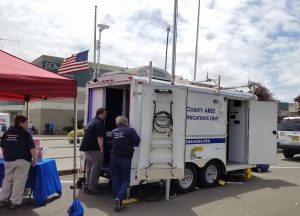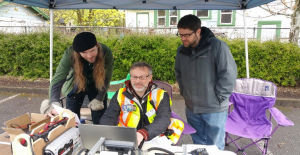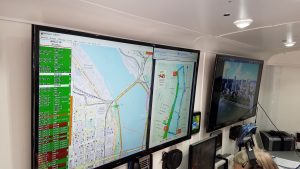I was originally licensed in Cleveland, Ohio in the early 1970’s as WN8QEB. With a Heathkit HW-101, homebrew antenna and a dipole in the attic crawl space 8 feet above me, I managed to make some contacts. After moving to Boston I charged through the license class tests up to Extra, and the call signs evolved with me, ending in K1XJ. Sing that one in Morse code if you want to get your feet tapping.
I got into the hobby because I was deep into depression, not nearly ready to come out as a transgender woman, and amateur radio was a way to get myself out into the world, and outside myself. I soon volunteered for public service, mostly ad hoc; work on parades, charity walk events or going out with fire fighters who were pumping water out of cellars in late winter. I had little training; mostly I watched what others did and tried to use my common sense.
One year for the Boston Pops July 4th concert, a family not far from me expressed alarm as some nearby youth set off small strings of firecrackers. I called in the situation to net control hoping a police officer might come over and mediate.
The Esplanade was extremely crowded. Even the walkways, which were supposed to remain open, were filled with people sitting on blankets hoping to be near the orchestra. Another ham near them began ordering the youth to stop. I called net control to report what was happening.
No police officers showed up; there were medical emergencies to take care of and the crowd was enormous and tightly packed. I then went over, empathized with the complaining family and asked the youth to wait until they went home before setting off any more firecrackers. The fireworks stopped, but it could have been because they just ran out of things to light off for all I know.
The other ham and I were both acting on our own instincts. Although I think I did the right thing at first in just reporting to net control, I believe I still went beyond my role in playing mediator, as the other ham did in playing cop, in essence. we both did the best we could with what we knew.
When I did come out, my life got very complicated. I lost paid work, had heavy health care expenses out of pocket, and a lot of people didn’t know how to react to transgender women. I forgot to renew my license in the confusion.
I got my license back in 2016 for the express purpose of participating in emergency preparations for my cohousing community, neighborhood, city and state. I studied by myself using the ARRL’s license manual and online practice tests, and the Portland Amateur Radio club made it easy to take the test.
I wasn’t sure how people would react to me, but I’ve been very blessed. The most delicious story was when I went to Ham Radio Outlet to purchase my HT. I walked in the store to see every person behind the counters busy with other customers. I slowly wandered along the counter, when a gentleman appeared from the back, tall and with a shock of white hair. “How can I help you, young lady?” he said. I hope all hams get what that meant to me. He properly gendered me as a woman at first sight; that made my heart sing by itself. But in the ham radio world YL, young lady, was a signal that he accepted me as part of the amateur radio hobby, one of the gang. That’s happened to me a couple of times since, and it is one of those small things that for me has made my life easier. Not everyone out there in the world is friendly to transgender women, and not every place is safe. To come back home to this hobby I love with that kind of greeting is wonderful.
I’ve had the privilege this time around of participating in classes held by Multnomah County ARES, and by the online nets, including the MCARES Tuesday traffic handling and digital modes training nets, and the Northwest Oregon Traffic and Training Net nightly sessions. I’ve had wonderful mentors and dedicated hams to learn from and feel grateful for all the time others have put in so that hams like myself can get up to speed, and learn the important protocols.
This is a big improvement from the first time around when I jumped into some situations with so little training or practice. I feel much more confident and ready to serve when the real disaster happens. To have a structure and solid group of mentors is, I think, an important part of making us a true resource for our communities. I hope to spend many happy hours volunteering with the good-hearted hams of the greater Portland area. Thank you.
 The
The  This was, by design, a very laid back exercise. Our goals included the sending of
This was, by design, a very laid back exercise. Our goals included the sending of 